Related Research Articles

Papua New Guinea is a country in Oceania that comprises the eastern half of the island of New Guinea and its offshore islands in Melanesia. Officially the Independent State of Papua New Guinea, it shares its only land border with Indonesia to the west and it is directly adjacent to Australia to the south and the Solomon Islands to the east. Its capital, located along its southeastern coast, is Port Moresby. The country is the world's third largest island country, with an area of 462,840 km2 (178,700 sq mi).

Port Moresby, also referred to as Pom City or simply Moresby, is the capital and largest city of Papua New Guinea. It is one of the largest cities in the southwestern Pacific outside of Australia and New Zealand. It is located on the shores of the Gulf of Papua, on the south-western coast of the Papuan Peninsula of the island of New Guinea. The city emerged as a trade centre in the second half of the 19th century. During World War II, it was a prime objective for conquest by the Imperial Japanese forces during 1942–43 as a staging point and air base to cut off Australia from Southeast Asia and the Americas.

Sir Paulias Nguna Matane was a Papua New Guinean politician who served as the eighth Governor-General of Papua New Guinea from 29 June 2004 to 13 December 2010. His memoir My Childhood in New Guinea has been on the school curriculum since the 1970s. He was a long-time contributor and columnist for The National.

The Pacific Solution is the name given to the government of Australia's policy of transporting asylum seekers to detention centres on island nations in the Pacific Ocean, rather than allowing them to land on the Australian mainland. Initially implemented from 2001 to 2007, it had bipartisan support from the Coalition and Labor opposition at the time. The Pacific Solution consisted of three central strategies:
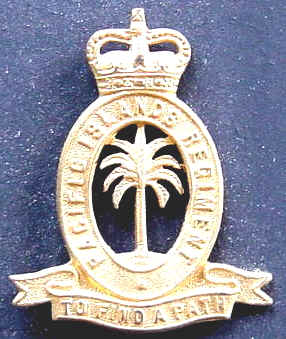
The Royal Pacific Islands Regiment (RPIR) is an infantry regiment of the Papua New Guinea Defence Force (PNGDF). The regiment is descended from the Australian Army infantry battalions formed from native soldiers and Australian officers and non-commissioned officers in the territories of Papua and New Guinea during World War II to help fight against the Japanese. Disbanded after the war, the regiment was re-raised in 1951 as part of the Australian Army and continued to serve until Papua New Guinea gained its independence in 1975, when it became part of the PNGDF. Today, the RPIR consists of two battalions and has seen active service in Vanuatu, Bougainville and the Solomon Islands.

Australian rules football in Papua New Guinea (PNG) is a developing team sport which was initially introduced by Australian servicemen during World War II. The governing body for the sport is the PNG Rules Football Council, with the development body being AFL PNG. The junior development version is known locally as Niukick. Regionally, AFL PNG is affiliated with AFL Oceania.

Sir Michael Thomas Somare was a Papua New Guinean politician. Widely called the "father of the nation", he was the first Prime Minister after independence. At the time of his death, Somare was also the longest-serving prime minister, having been in office for 17 years over three separate terms: from 1975 to 1980; from 1982 to 1985; and from 2002 to 2011. His political career spanned from 1968 until his retirement in 2017. Besides serving as PM, he was minister of foreign affairs, leader of the opposition and governor of East Sepik Province.

James Marape is a Papua New Guinean politician who has served as the prime minister of Papua New Guinea since May 2019. He has been a member of the National Parliament of Papua New Guinea since July 2007, representing the electorate of Tari-Pori Open in Hela Province in the New Guinea Highlands. He has held Cabinet Posts as Minister of Education (2008–2011), Minister of Finance (2012–2019), and Minister of Foreign Affairs (2023–present). Marape entered the 2022 elections under the banner of the Pangu Party and won more seats than any other party. He was therefore entitled to form the government. His new government was elected unopposed by the new parliament.
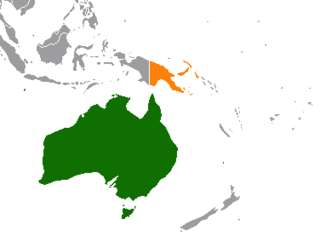
Foreign relations exist between Australia and Papua New Guinea. Papua New Guinea is Australia's closest neighbour and a former colony of Australia. Both nations share the same continent in the Oceania region. Papua New Guinea has developed much closer relations with Australia than with Indonesia, the only country with which it shares a land border. The two countries are Commonwealth realms. In contemporary times, Papua New Guinea is one of the largest recipients of Australian aid. Some critics have pointed to instances where this has led to an outsized Australian influence on Papua New Guinea politics.

The Papua conflict is an ongoing conflict in Western New Guinea (Papua) between Indonesia and the Free Papua Movement. Subsequent to the withdrawal of the Dutch administration from the Netherlands New Guinea in 1962 and implementation of Indonesian administration in 1963, the Free Papua Movement has conducted a low-intensity guerrilla war against Indonesia through the targeting of its military, police, as well as civilian populations.

Indonesia–Papua New Guinea relations are foreign relations between Indonesia and Papua New Guinea, two bordering countries north of Australia.

Airlines PNG Flight 4684 (CG4682/TOK4684) was a scheduled domestic passenger flight operated by Papua New Guinean airliner Airlines PNG, flying from Jacksons International Airport in Papua New Guinea's capital Port Moresby to Kokoda Airport in Oro Province, Papua New Guinea. On 11 August 2009, the aircraft operating the flight, a de Havilland Canada Twin Otter, crashed into a forest in Kokoda Valley, a popular trekking site in Papua New Guinea, while carrying 13 people in bad weather. A search and rescue operation was conducted by authorities and found the wreckage of the crashed plane on the next day, 12 August 2009. The aircraft was severely damaged, and searchers found no signs of life. Papua New Guinean Search and Rescue Agency then announced that everyone on board was killed instantly in the crash.
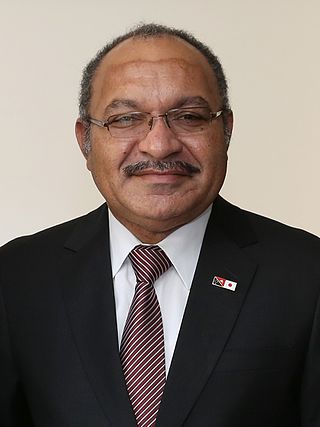
Peter Charles Paire O'Neill is a Papua New Guinean politician who served as the seventh Prime Minister of Papua New Guinea from 2011 to 2019. He has been a Member of Parliament for Ialibu-Pangia since 2002. He was a former cabinet minister and the leader of the People's National Congress between 2006 and 2022. He resigned his position as prime minister to avoid a vote of no confidence, and he was succeeded by James Marape. O'Neill won re-election to the National Parliament of Papua New Guinea in 2022 in the first round with a large majority, which is unusual in the country.
Boroko is a suburb of Port Moresby, the capital city of Papua New Guinea. It includes a residential area and a sports and recreation precinct, and was once a significant commercial centre but the business area is now in decline.

The Manus Regional Processing Centre, or Manus Island Regional Processing Centre (MIRCP), was one of a number of offshore Australian immigration detention facilities. The centre was located on the PNG Navy Base Lombrum on Los Negros Island in Manus Province, Papua New Guinea.
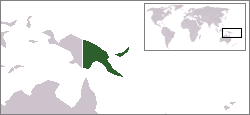
Papua New Guinea (PNG) is officially known as the Independent State of Papua New Guinea after gaining absolute independence from Australia on September 16, 1975. PNG is the largest country in the South Pacific region and comprises the eastern side of New Guinea including its islands. Crime in Papua New Guinea, both violent and non-violent, have contributed to the developing country's crime rate being one of the highest in the world.
The COVID-19 pandemic in Papua New Guinea is part of the worldwide pandemic of coronavirus disease 2019 caused by severe acute respiratory syndrome coronavirus 2. The virus was confirmed to have reached Papua New Guinea on 20 March 2020. On 4 May 2020, Papua New Guinea was declared COVID-19 free. However, on 20 June, the government confirmed another case of COVID-19, meaning that the disease was present again within the country.
Events in the year 2021 in Papua New Guinea.
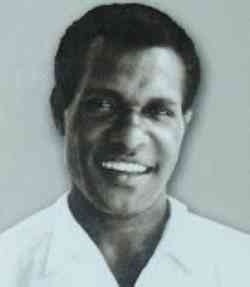
Sir Ebia Olewale (1940–2009) was a politician in Papua New Guinea (PNG). He was elected as a member of the House of Assembly of Papua and New Guinea in 1968 and went on to hold several ministerial positions during the period of self-governance and after PNG's independence in 1975, including that of deputy prime minister. He was knighted in 1983 and served as chancellor of the University of Goroka from 2000 to 2006. From 2002 until his death, he was a director of the Papua New Guinea Sustainable Development Program.
Events in the year 2022 in Papua New Guinea.
References
- 1 2 3 4 "PNG Judge Stoned To Death". The Post-Courier . Pacific Magazine. 2007-10-22. Retrieved 2007-11-19.
- 1 2 3 4 5 "Papua New Guinea magistrate stoned to death". Herald Sun. Associated Press. 2007-10-23. Retrieved 2007-11-19.
- 1 2 3 4 5 6 Rheeney, Alexander (2007-10-30). "Policeman Charged Over Magistrate's Death". Pacific Magazine . Retrieved 2007-11-19.
- ↑ Arlo, Joshua (2007-11-12). "Cappo court papers yet to be completed". Pacific Magazine . Archived from the original on 2007-11-16. Retrieved 2007-11-19.